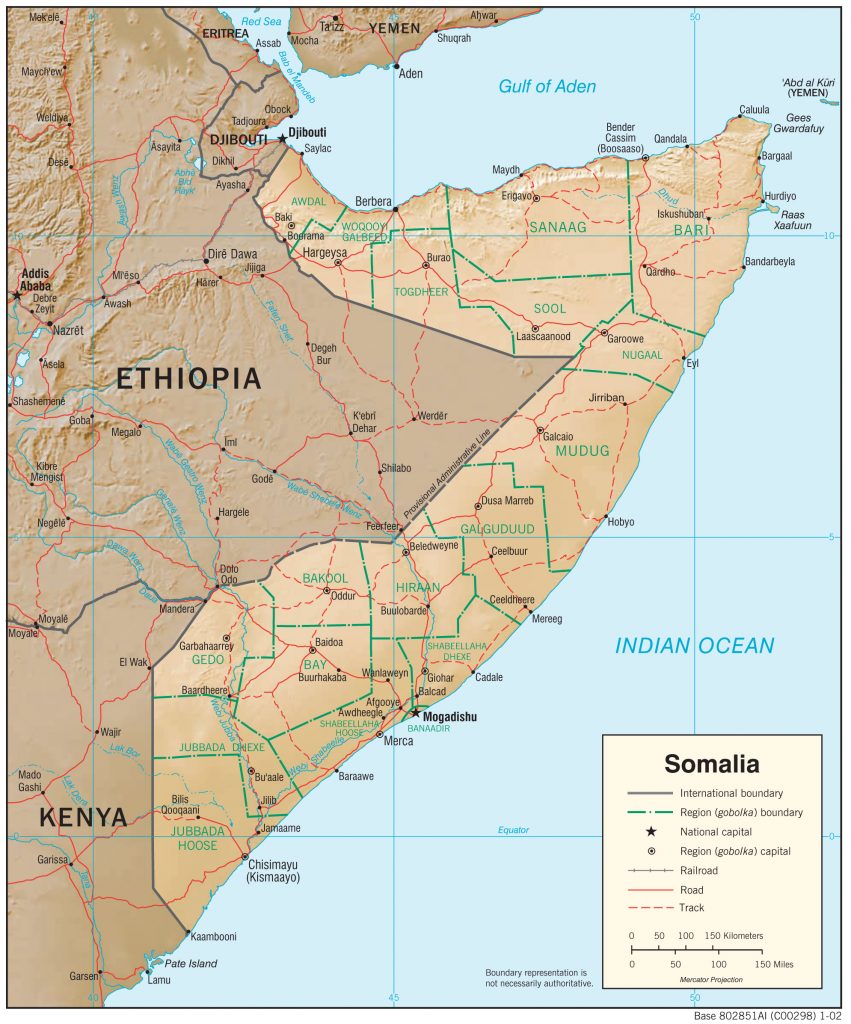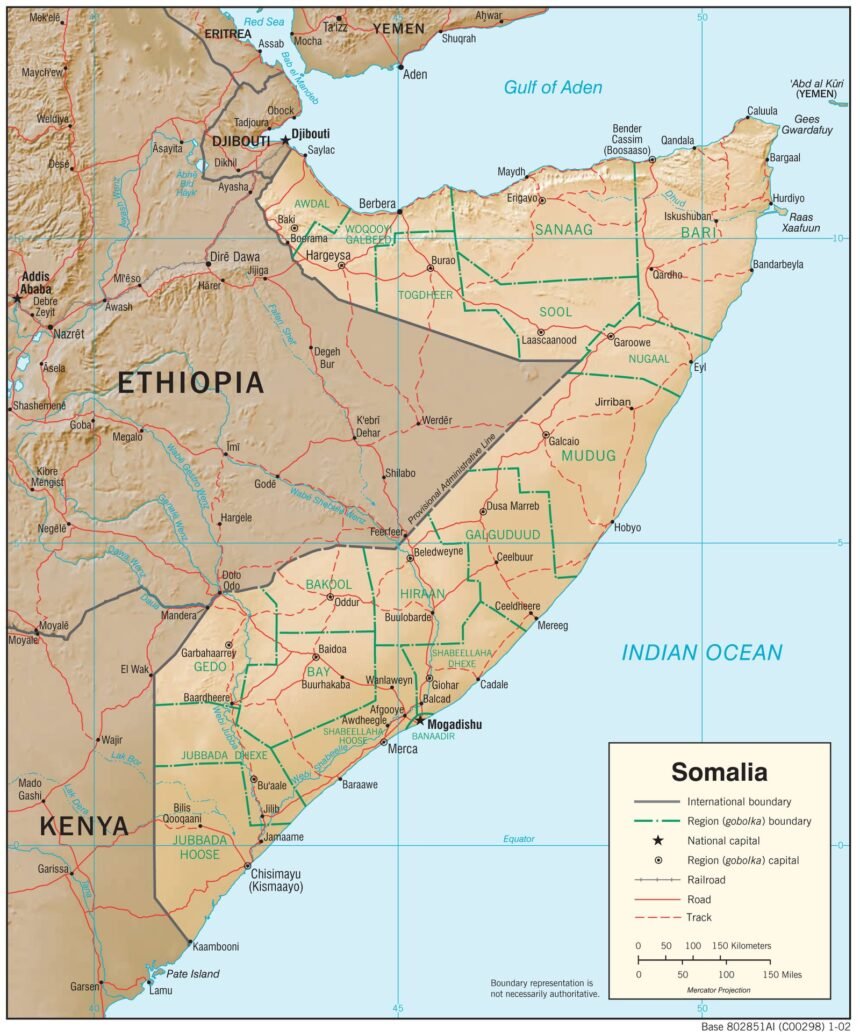By Abdihakim M Abdi
In the past few months we have seen an intensification of the conflict between the Federal Government of Somalia (FGS) and the Federal Member States (FMS). From the outset, it was apparent that the centralist Nabad and Nolol (N&N) administration was adamant to bring the country towards a more concentrated power structure where Hamar (Mogadishu) rules supreme and the regional capitals take orders.

Despite a slew of initial successes and the installation of “friendly” leaders in some of the FMS, Jubbaland has become a particularly troublesome roadblock for the centralist N&N administration. In the words of a Reer Waamo elder during Barre Hiiraale’s attempted attack on Kismaayo following Ahmed Madoobe’s first election,“Daqsi (duqsi) garoor wuu ku dabaashaa, fuudna wuu ku gubtaa, Barre Hiiraalow in badan baad dabaashanaysay ee tan waa tii aad ku guban leheed – A fly swims in yoghurt and burns in broth, Oh Barre Hiiraale long have you swam and in this affair you shall burn.”. For the NN administration it has become “Nabad iyo nololey Jubbaland waa tii aad ku guban leheed – Oh N&N administration in the Jubbaland affair you shall burn!”.
In the aftermath of the fallout following Ahmed Madoobe’s re-election as president of Jubbaland, we have seen a coalescing of the erstwhile divided N&N opposition with the aim of countering what they see as the dangerous centralist dogma and dictatorial tendencies of the N&N administration – bar the exception of certain members of the opposition such as Abdirahman Abdishakur who have taken a “lafa maroodi iyagaa la isku jebiyaa – meaning turn the brothers against each other approach.
We have also heard for the first time in the modern Somali political discourse loud calls to rethink the whole federal structure – and not in the way the leaders of the N&N administration would like. Rather, we have heard from certain influential individuals in the N&N opposition calls to further the devolving of power away from Hamar and towards the FMS in a confederal Somali state. Recently, influential members of the Puntland political elites raised such calls in a joint letter, and Ahmed Madoobe hinted at such a sentiment when he declared during a press conference following the defacto air-blockade the FGS placed on Jubbaland “Maamulka hawada Soomaaliya waa in laga qaadaa gacanta dawladda dhexe oo loo gacangeliyaa dawlad-goboleedyada – Control of the Somali airspace must be removed from the central government and handed over to the FMS” or words to that effect.
Multiple meeting have also been held across the globe discussing the benefits of a confederation and how best to implement it. See this interview following such a meeting in Garoowe recently.
One can forecast that such calls will only continue to grow louder and louder, and the opposition will begin to demand more assertively for a confederation. However, unanswered questions remain. The federal system was agreed upon during the Embigathi conferences and has been enshrined in the provincial constitution. The only way to change the federal system would be to hold fresh national inclusive conferences and substantially rewrite the constitution. It is unlikely the centralist forces currently in power would be party to such initiative. Nor does it seem likely that the international community which has been bankrolling Somalia’s state rebuilding process would be willing to see decades of investment go down the drain only for a return to the drawing board.
Nor does it seem likely that the loose opposition will continue to be as united as it is today. As the Somalis say “Dani waa seeto – necessity is a shackle”; today the opposition are only united on two points: their opposition to the centralist and dictatorial tendencies of the N&N administration, and their desire to hold the national elections on time without a delay. Beyond these two points, there doesn’t seem to be much commonality amongst these heterogeneous strange bedfellows (and former political enemies). It is therefore unknown whether the opposition will stay united in the mammoth task it has in front of it in aspiring for a fundamental reconfiguration of the constitutional foundation of the Somali state.
Is a confederacy the panacea?
When the federal system was first introduced to the Somali society it was hailed as the panacea to solve all ills plaguing the failed state and revive it to its former glory. Almost 15 years on and countless reconciliations that was the foundation of the Embigathi to the Salbalaaar administrations, all the way to this current Nabad iyo Nolol administration, despite prominent gains in certain areas the revival of the Somali state is still a distant dream. National reconciliation is as far off today as it was following Abdullahi Yusuf’s sham National Reconciliation Conference he held immediately after entering Hamar on the backs of Tigrayan tanks, the economy is still in tatters despite some modest gains. Al Shabaab and other terrorist organisations are still in control of large landmasses, and foreign armies are still present in the country and continue to behave as the occupying forces they are. Looking back over this period, one may reasonably conclude that the federal system has failed in its principle aim: the restoration of a stable Somali state.
Newly-found confederalists (read former federalists) argue that the federal system was stymied at every turn by staunch centralists and was never given a fair opportunity. The only solution they claim is to further devolve power to the states and weaken the central government to such an extent that the centralist threat is neutralised once and for all. However, it is not clear how such further devolution of power could lead to the revival of the Somali state. The only thing it is likely to lead to is the balkanization of the country and the continuation of all the problems that plague the Federal Republic of Somalia but at a micro level.
So, what is the solution?
Somalia’s problems, contrary to the thinking of many people, did not begin at 1991, they began much earlier and relate to the very foundation of the state. Somalia at independence inherited a colonial system that was at odds with the history, culture, and thinking of the Somali people. Although this article is not intended to examine the problems of the founding of the Somali state, such inconsistencies between the colonial system of the Somali Republic and the psyche of the Somali people eventually led to the downfall of the civilian administration and the birth of the Kacaan revolutionary regime. The Kacaan regime promised to fix the problems of the Somali Republic, however it later too ended in failure. Therefore, trying to return the country to a pre-1991 level is not only a misguided endeavour but a futile one.
This explains why the efforts of both the centralists and the newly-found confederalists are bound to end in failure. The colonial system inherited at 1960 has been proven to be an utter failure in the Somali context. Rehashing it in different iterations will not lead to any result other than failure – ‘boog kor laga dhayo ma bogsato – superficial treatment of an infected wound does not cure it’.
What is therefore needed is a home-grown solution, ‘xal xera-u-dhalad ah’. Somalis need to fundamentally rethink the organisation of the state and its organs. I argue that it is the incongruities between the fundamentals and structures of the colonial Somali state structure and the Somali psyche which led to its ultimate downfall. Therefore, to get out of this impasse Somalis need to come up with a system that is in line with their national psyche and situation.
This will require an honest acceptance of the reality of the Somali psyche and an examination of the history of the Somali people to look for solutions for both the present and the future. Such an approach should not be seen as a return to a tabula rasa state of affairs, Somalis have 60 years of failure to learn from and a much longer history to draw inspiration from. Trying to ignore tribalism and other potentially negative aspects of the Somali psyche and wishing them away will not work – it is merely burying our heads in the sand.
Somalis should not be boxed in by the colonial system enforced upon them by the colonialists (and maintained today by those very same colonialists who go by the name of the International Community), but rather they should have the intellectual and structural freedom to experiment with other forms of governance more in line with their psyche and traditions.
Indeed, the rise of China and the collapse of Western Democracy in the face of populism has shown to all that the Western system is not universal as is claimed by its proponents, it is at best idiosyncratic. Trump’s America and Brexit Britain are two poignant current examples of the shortcomings of the Western model. Read this excellent article by Patrick Gathara for more . The Gulf monarchies are also examples of the stable alternatives possible, even in tribalistic societies where clannish tendencies are high.
Conclusion
The recent political crisis in Somalia is only the latest symptom in a series of crises that have plagued the country since independence, crises which all point to a fundamental problem in the structure of the Somali state. I argue that the currently emerging centralist-confederalist paradigm is nothing more than ‘boog kor laga dhayayo – superficial treatment of an infected wound’ and therefore will not lead to the revival of the Somali state.
What is needed are home grown solutions to the structure of the Somali state that are congruent with the psyche and traditions of the Somali people. A structure that doesn’t deny the realities of the Somali psyche (such as tribalism), but rather one that searches for innovative approaches to accommodate those realities, rather than rehashing failed attempts.
Abdihakim
M Abdi
Email:A_maalim@hotmail.co.uk


Leave a Reply